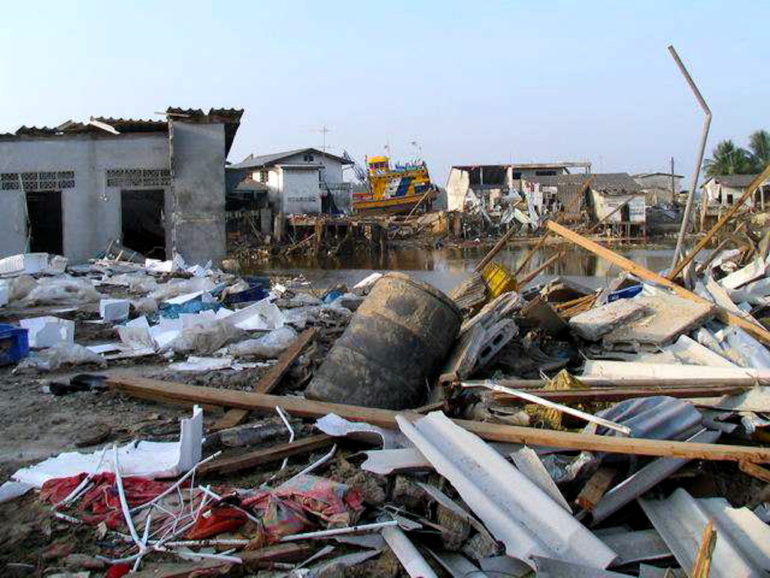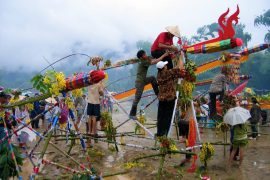After having come to Phuket 4 days after the Tsunami in order to help, my Swedish travel companion Max and I had worked 48 hours straight as a Tsunami volunteer. Most of the time we spent on phones, taking down names of missing people. Now this is how the story continued.
Debbie, an American girl, gives me a ride on her motorbike late in the afternoon, we are going back to Phuket City. We stop at a hospital, as she wants to leave a message for a German guy in there and considers me useful. The things we see here are the same as in the helping centre: Photos of missing people everywhere, free telephone and internet for the people affected, tables with volunteer helpers, and piles of donated clothes. Eventhough it has already been three days since the disaster, there are still beds in the aisles, as the hospital is just as overextended as all the others in town.
After a short search we find the bed of the German. People tell me that he has lost his wife and his two daughters in the wave. Desperation is carved into his face. There are scratches all over his body. Some people are standing around his bed and trying to bolster him. Debbie’s message is not needed anymore, so we leave. I am happy that I don’t have to talk to the poor man. I wouldn’t have known what to say.
I spend another night in the call centre. It is a lot quieter today. But still I am taking down a few names of missing people; French, Swedes, Irish, and again some Germans. Today I can sense the subliminal desperation of the people even more. The call that strikes me the most, comes from a Norwegian. He is looking for his two-year-old son. Just like in the other cases, I suggest taking down his name. If he had already been put in one of the systems, the computer would find him, I tell him. Hesistantly the man replies that this won’t be much of a use in his case as nobody would be able to know his son’s name. The kid cannot speak yet. I am in need of words.
After that I assist two young Germans who have just flown in from home to find their parents with their first steps. I notice that the sheets to register missing people are recycled prints of the horrible photos of unknown dead people, and I have trouble believing that.
Someone was supposed to take over at midnight but nobody shows up, so I stay. Later I lay down on a couch, like that I can sleep at least between the calls which are not from Thais.
Friday feels different. A centre for foreign volunteers has been set up. But the coordination does not work very well yet. I ask what I can do. They tell me to go to the airport and welcome workers of international aid organisations, and send them to the right places. This is supposed to happen in the afternoon, at the moment there is nothing to do. I wanted to make that clear as there is a German TV team that wants to film a broadcast on me.
We drive to Patong Beach, and for the first time I see the devastation with my own eyes. Surprisingly, the beach looks entirely virgin: turquoise water, fine white sand. But that makes the destruction seem even more fatal. Even 100 meters off the waterline whole buildings have been virtually eliminated, only big piles of rubble attest to their existence. Streetlamps have been twisted like toothpicks, massive concrete aprons have been moved several meters. The trees near the water show their roots. In between all of that there are tourists sunbathing with beer in their hand, some play volleyball.
After a few hours with the TV people I am helping in the call centre again and am making announcements for emergency airplanes back to Europe. It is of high importance now to fly out all the victims as fast as possible. The Thais on the phones know me all by now, and are courteous as always. Probably it’s due to their friendliness that people can still keep heir countenance at all.
The job at the airport was taken care of by someone else. Instead I am now supposed to drive to a nearby beach with three other volunteers. Nobody knows what the task is going to be; people are talking about carrying heavy things. Equipped with bags of food, water and protective masks we take our seats on the back of a pick-up truck. After about an hour we reach a beach that the wave has only slightly destroyed as it is rather steep. There is nothing we can do here except leaving some water for the Thais who are working on the reconstruction of their huts. After some communication problems with the driver we understand that we will keep driving. The drive lasts two hours in the end.
It is dark and we are in Khao Lak. The place I had never wanted to see. Someone asks us if we can maybe stay for three days, as there is a lot to do. We negate in unison. After we have unloaded the relief supplies, we still have an hour before our return. As everything seems to go haywire here, we agree to help for this short amount of time. Before we can even think, someone puts protection covers over our hair and gives us two pairs of rubber gloves that we have to put on top of each other. We sniff on little bottles of menthol and put a cream underneath our nostrils that is supposed to cushion the smell. Putting on the face masks made of paper, we even use three or four on top of each other. We change our shoes for gumboots. Then we stick our arms forward, and a woman is putting two protection overalls on each of us. I’m feeling dull when I think about what we have to expect now, I am walking in slow motion.
With inquiring looks on our faces, another volunteer and I walk straight into hell.
Soldiers are carrying dry ice on blood-soaked stretchers into the Buddhist temple which, since two days ago, serves as a collective point for all the victims of the inferno. I look to the right and see corpses in plastic bags. Hundreds of them, meticulously put in lines. Strings around neck and legs give the bags enough contour to recognize there are human beings inside. Blocks of dry ice sit upon the bags. The fog that emerges from them, and billows above the whole setting makes the terrifying look of it even more spooky. On my lefthand side there is a big open hall. There are countless wooden coffins in it, the lids are all open. I see doctors and forensic experts with big scalpels. There is sweat on their foreheads, the only part of the body that isn’t covered. As soon as the DNA specimen has been extracted, six to eight people carry the coffin outside and lift the remains onto a big plastic tarp from which the corpse is being rolled into a plastic sack and taken away. Someone tells me that dead Thais skip the process of identification and are directly veiled forever.
Despite the presence of a good number of people the noise level is very low. Everything happens in a rush, but seems to work like a precise clockwork at the same time. You can see that the volunteers – mainly Thais – have had enough opportunities to practise their moves.
There is some coffins sitting in front of the hall open. The bodies display a horrible sight. Arms and legs that have turned to black are stiffly sticking out of the wooden boxes. The corpses are bloated, the limbs distorted. One can not recognise faces anymore, the skin is just a soft mass. On some of them people have moved leftover clothes to be able to at least guess the sex of the person.
The ground is muddy from the melting dry ice and the decomposing bodies. There are little white maggots all over the place. The coffins are smudged all over with blood and mud. Apparently they are being used several times. I help the people in their protection clothes to carry them to the side of the place. The smell is indescribable. Not like anything I have ever smelled before. The menthol lotion at my nostrils doesn’t hardly help at all.
After we have helped a bit here and there, but most of the time just tried to understand what is happening around us, the Thais and the other volunteers start to cheer in applause all of a sudden. This seems rather displaced, but is understandable, as they have just packed and taken away the last corpse for today. The Canadian Nishan and I are very relieved when we return towards the exit. We pass massive containers which are being lifted onto trucks in the glow of big floodlights. They are full of human bodies. Even here the Thais are wearing a smile on their faces. Nevertheless I decide that I will definitely not return to this place. Nishan makes the same decision for himself.
The way back on the pallet goes by without many words. We are very tired and lost in thoughts, while stunning nightly Thailand flashes by.
When we return to the helping centre late, Max is there, too. We decide to have a beer together at least. After all, it is New Year’s eve. Close to the town hall we find a little bar with Thai country music. We drink and talk. Each one of us has his own experiences from the last days. At twelve the Thais quietly salute the new year, and we join them. There are no fireworks at all.
Today the situation has changed once again. Almost all injured tourists have been flown to their countries now. The embassy tents have been converted into places for the psychological care of survivors and relatives of the disaster. In the call centre there is now a table for DNA-identification of relatives. Someone has changed the channel on the TV, the Thais are watching an English soccer game. In the yard there are still piles of relief supplies coming and going. Small food stalls give out free food without a pause.
It has been announced that there will be 1600 new corpses at the collective point in Khao Lak today. No idea where all those bodies are still coming from. I prefer staying here and helping out with phone calls to relatives in German speaking countries. By now there are several databanks for missing people, and the coordination demands a lot of effort. However, it all seems to become a little quieter slowly, and I hope that I can leave towards the North soon.
I have to do some thinking and reflecting.
This post is also available in: German





